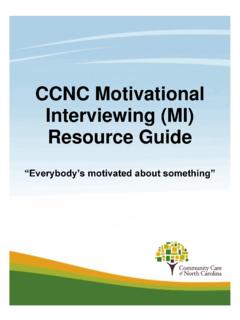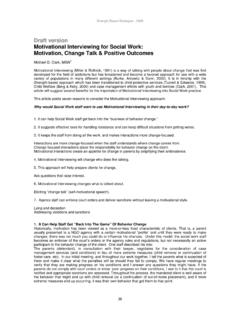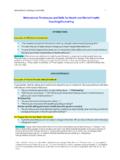Transcription of 10 MOTIVATIONAL INTERVIEWING TIPS - CCWJC | …
1 10 motivational interviewing tips Here are some important principles to keep in mind in working with your patients (composed with great assistance from Miller and Rollnick, MOTIVATIONAL INTERVIEWING , 2nd ed, 2002): 1) Always keep the spirit of MOTIVATIONAL INTERVIEWING in the forefront of everything you spirit is caring and love of the are what is most your needs. 2) Resistance and ambivalence are you experience them, you need to change how you are talking to the patient and 3) Remember that change talk on the part of the patient means that the conversation is in the right is the signal that you have veered off course. 4) Unless a current "problem" behavior is in conflict with something that the patient values more highly, there is no basis for MOTIVATIONAL INTERVIEWING . 5) Your patients are your teachers. Every patient offers an opportunity to shape and refine your reflective listening skills. Every patient TEACHES YOU what is important to them if you pay attention.
2 6) No matter where patients start in their readiness to do the target behaviors, you can tell you are on the right track when your communication enhances commitment/change talk. 7) Learn to notice your own emotional and behavioral responses to the patient's dissonance and ambivalence. Become more aware of what takes place inside you when the patient resists (keeping in mind that your communication is contributing to the resistance). Learn to be aware of your anxiety and learn to have it act as stimulus of cue to respond realize that the patient is providing valuable information that is disconcerting to YOU. 8) Whenever you defend the "good side" of patient's ambivalence or resistance (why the patient should take the drug, stop smoking, lose weight), you force the patient to take the "bad side" (not take the drug, etc). Remember, ambivalence occurs BECAUSE the patient weighs the good and the bad equally. Don't force the patient to defend the !
3 Ask would have to happen? What would make you more ready? Confident? Etc. 9) LISTEN, LISTEN, LISTEN and reflect back what you understand. 10) Reflecting your understanding does NOT mean simply means that you understand and are not judgmental. MOTIVATIONAL INTERVIEWING BASICS y Explore the decisional balance (pros and cons). y When faced with Ambivalence or Resistance, EXPLORE (don t fix) y Avoid closed ended when asking permission. y It is a process. y Remember to avoid the righting reflex. MOTIVATIONAL INTERVIEWING EXAMPLE Patient: I know smoking is bad for me. I know I should quit. Provider: Then why don t you? (biomedical) Possible MI Responses y May I tell you what concerns me about your continuing to smoke? y You are certainly right about smoking being bad for you. Tell me more about that. y Earlier you told me that you have a goal of reducing your risk of stroke and heart attack. On the other hand smoking increases those risks.
4 What are your thoughts about that? y It has been hard to quit smoking even though you are concerned about its impact on your health.












